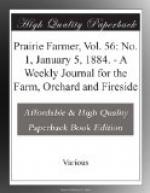Compared with the other great cities of the Union, and even with previous years in her own history, Chicago had a prosperous business year in 1883. The total trade of the year foots up $1,050,000,000, which is a slight gain over that of 1882. The receipts of flour were 4,403,982 barrels; wheat, 20,312,065 bushels; corn, 74,459,948 bushels; oats, 37,750,442 bushels; rye, 5,662,420; barley, 10,591,619. Of cattle there were received 1,878,944 head; hogs, 5,640,625; sheep, 749,917; horses, 15,255; dead hogs, 55,656. Of seeds, 122,582 tons; broom corn, 15,038 tons; butter, 53,987 tons; hides, 34,404 tons; wool, 20,122 tons; potatoes, 13,000,000 bushels; coal, 4,042,356 tons; hay, 50,000 tons; lumber, 1,848,817,000 ft.; shingles, 1,154,149 M.; salt, 1,096,587 barrels; cheese 23,590 tons. The total value of farm products of all kinds is estimated at $402,000,000, which is $20,000,000 above the valuation of that of 1882. The products of Chicago manufactures are valued at $325,000,000. In 1881 the receipts of hogs amounted to 6,474,844 head, and in 1882, 5,817,504 head. The wholesale mercantile trade has fallen off somewhat, as it has all over the country, owing to depression that seems to be universal. In manufactures the city is making wonderful development. In growth she is still unchecked and without a rival in the world among large cities and business centres.
STRONG DRINK.
We often see in the papers the amount in dollars and cents, that strong drink costs the people of this country. Some one has been making out similar statistics for Great Britain, and finds that if the total house rent is added to the rent of farms in the three divisions of the Kingdom the total is $30,000,000 less than is usually spent for drink. Add together the cost of the linen goods, cotton goods, coal, tea, coffee, sugar, milk, butter and cheese and the total is only $45,000,000 in excess of the sum spent in drink. And this is only the direct cost. The indirect expense of drink—the crime and misery entailed, the cost of prisons and almshouses, criminal courts and trials, the loss from idleness, incapacity, blunders, sickness—towers above these figures in colossal magnitude. Counting all these things it may be said of both countries that strong drink costs more than sufficient to supply the personal needs—food, clothing, and homes—of all the people. It is indeed a fearful showing.
ANSWERS TO CORRESPONDENTS.
CHARLES DE LONG, Artesia, Miss.—THE PRAIRIE FARMER has the reputation of knowing all about the prairies, north and south, and, therefore, I appeal to it to tell me whether the Japan persimmon will be likely to be hardy in this section, some portions of which is, as you probably know, a prairie country?




